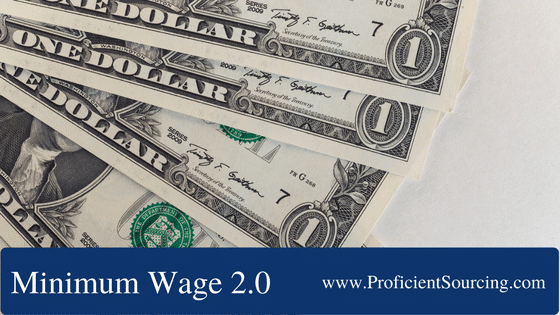Minimum wage has been a hot topic lately, and the subject of a recent newsletter (https://proficientsourcing.com/minimum-wage/). In it’s simplest form, the arguments for say it’s an economic boost and step to address income inequality. The cons say it hurts those most in need of jobs (the unskilled young). So this time we’ll examine the issue a bit more and hope you will add to our blog.
Our first question is if the minimum wage question is worthy of all the air time. For example, does it affect larger companies at all? Most manufacturers we know struggle to find good employees, and those sought need basic skills. As a result, starting wages are well above the minimum. Our circle of contacts has very few businesses using significant numbers of very low skill workers where the minimum wage would be a factor. Is this observation correct? Again, we would appreciate blog comments.
So who, exactly, is working for minimum wage these days? According to the Bureau of Labor Statistics April 2016 report, (https://www.bls.gov/opub/reports/minimum-wage/2015/home.htm) only 3+% of all hourly paid workers have wages at or below the federal minimum. This report also notes about half of minimum wage earners are under 25 years old. What this means is that this issue directly involves about a million people over the age of 25 and that’s about 1% or so of the total work force. Given these small numbers, does the minimum wage issue deserve the attention it gets?
But if you are interested, the BLS report provides very interesting statistics. In the main, minimum wage earners are young, part-time, female, and minority. The actual statistics are a bit more complicated than that, but it’s a decent summary.
So just what happens if a significant minimum wage is legislated? It would seem likely that marginal workers would be those most jeopardized. To offset that, some would enjoy the benefits of a sudden increase in income. Beyond that, would anyone really be affected? And then do we want the federal government dictating the value of work at the bottom of the wage system?
Since only 3-4% of hourly workers would be affected, would a minimum wage have a dramatic economic impact either pro or con? It seems to us that very low paying jobs are useful as a first step in the work ladder for many. If a worker is not a young or part time, then relying on a minimum wage job as a primary income source will be a big problem. And the root cause of that is unlikely to be solved by a minimum wage increase.
Not counting those who’s wage is tied to the minimum wage via some company wage scale, this entire issue affects a very small number of people. Most of these are just starting out in the work force, either as a part time job or perhaps some supplementary and temporary work. Does it deserve the spotlight it gets?
As we noted in our earlier newsletter, the details of minimum wage effects are complicated, and both sides of the issue cite significant effects. A good summary of the arguments can be found here: https://minimum-wage.procon.org/.
Perhaps you can contribute to this via our blog! We’d greatly appreciate any comments.


